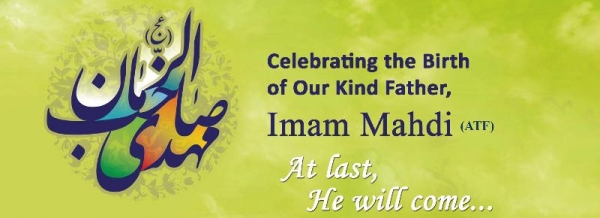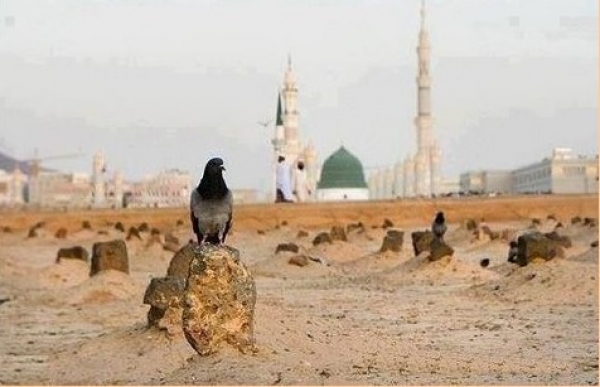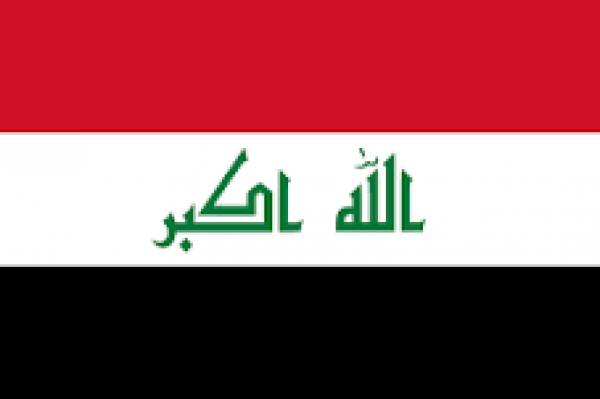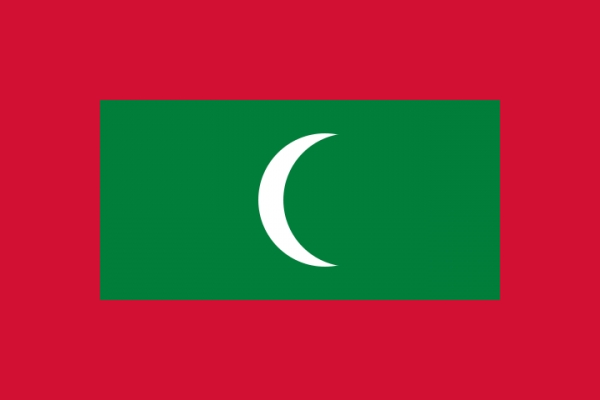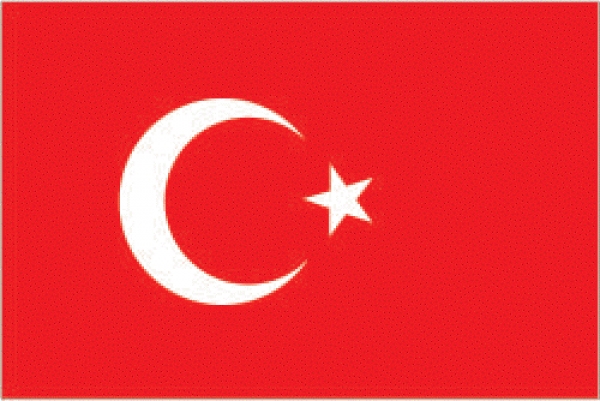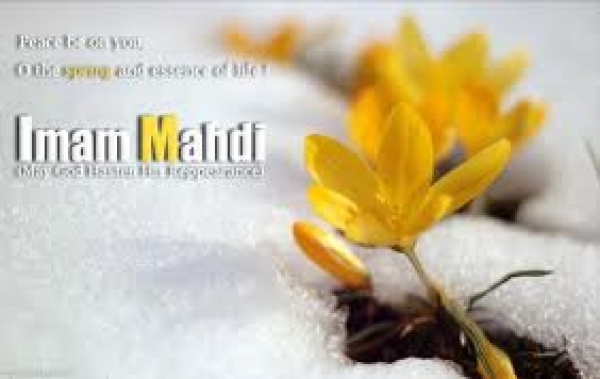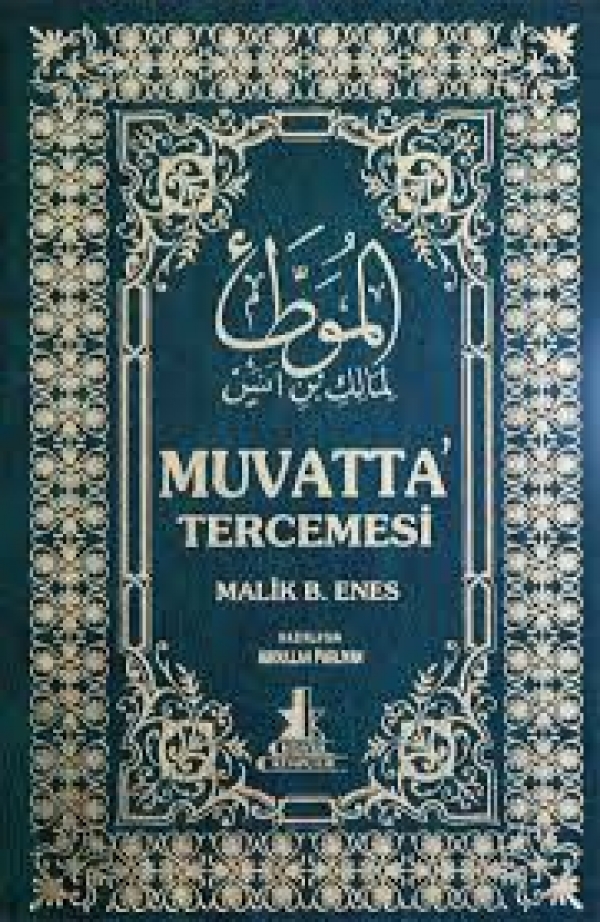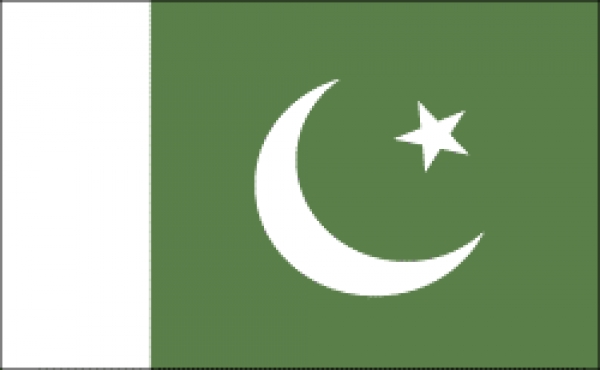hasania
Supreme Leader's Speech on the Occasion of Imam Mahdi's Birth Anniversary
17/08/2008
The following is the full text of the public speech delivered on August 17, 2008 by Ayatollah Khamenei the Supreme Leader of the Islamic Revolution.
In the Name of Allah, the Beneficent, the Merciful
First of all, I would like to congratulate you dear brothers and sisters on this auspicious Eid, which is full of hope and promise for all faithful people. I also congratulate all those who believe in the leadership of the Prophet's (s.w.a.) household and all those who fight oppression as well as all vigilant, knowledgeable, and freedom-seeking people.
The 15th of Sha'ban is a day that is full of promise. This promise is neither peculiar to Shia Muslims nor even the entire Islamic Ummah. To the best of my knowledge, the promise of a bright future for humanity and the arrival of a promised savior for promoting justice are universal beliefs that are shared by almost all divine religions across the world. Apart from Islam, Christianity, and Judaism, even Hindi faiths such as Buddhism - and other religions that most people have not even heard about - have informed their followers of such a future in their teachings. In fact, this has provided man with a kind of hope throughout history. It is a response to human need for this hope.
Divine religions - which often have divine and celestial roots - did not intend to give people false hopes. They all expressed a reality. There is a reality in the creation of man and in the long history of humanity, and that reality is that one day the battle between good and evil is going to result in the defeat of evil and the victory of good. After this stage, man's true and pleasant life is going to begin in which struggle will no longer imply fighting. Rather, people will struggle for equality in doing righteous deeds. This is a fact that is shared by all religions.
One outstanding characteristic of our Shia beliefs is that this denomination has transformed this aspiration and this abstract concept into a concrete reality. In fact, when the Shia are waiting for the arrival of the promised savior Imam Mahdi (a.s.) and are not lost in their fantasies, they are searching for a reality. He is alive and lives among the people. He sees people. He can feel their sufferings. Those who are lucky enough and have the capacity sometimes meet him without recognizing him. He is alive. He lives among us with his parents. He has a name. This is what characterizes our Shia beliefs.
And the followers of other faiths who do not believe in this reality have never been able to provide any logical reasons to reject this belief. There are several obvious and strong reasons, also accepted by Sunni Muslims, which are a testimony to the existence of this exalted servant of God. All these reasons provide evidence that Imam Mahdi (may our souls be sacrificed for his sake) is living among us - and we are all aware of his characteristics. This is what has been cited in many non-Shia sources as well.
The birth date of the pure-hearted son of Imam Hasan al-Askari (a.s.) is known to everyone. His miracles and those who are connected with him are also known to us. God Almighty has granted a long life to him. These are the characteristics of the Imam of the Age (may our souls be sacrificed for his sake) whom all the nations of the world, all ethnic groups, and people from all faiths and races are impatiently waiting for at all times. These are the beliefs of Shia Muslims about this important issue.
One important point regarding the issue of Mahdaviat is that in the Islamic and Shia belief systems, waiting for the arrival of Imam Mahdi has been interpreted as waiting for salvation. What does salvation mean? It means being saved. When do we usually yearn for salvation? We do so when we are in a difficult situation, and when there is a problem. When we face problems, we are in need of salvation - that is someone who can solve our problems and save us. This is an important point.
The true meaning of waiting for a savior is that those who believe in Islam and the religion of the Prophet's household (a.s.) identify the problems of humans in the modern world. This is what they should actually do. They are waiting for the problems of humanity to be solved. The issue is not limited to my or your problems only. The Imam of the Age (may our souls be sacrificed for his sake) will come to solve the problems of humanity. He will come to save humanity forever.
This means that those who are waiting for the arrival of Imam Mahdi are discontent about the current situation of the world - the unfair situation of the world in which many innocent people are oppressed, many are misled, and many others do not find the opportunity to worship God. Waiting for the arrival of Imam Mahdi means opposing the current situation that is prevalent in humans' life, and which has been caused due to the prevalence of ignorance and carnal desires in humans' life. This is the true meaning of waiting for the arrival of Imam Mahdi.
Look at the current situation of the world. The same situation which has been talked about in the traditions related to the arrival of Imam Mahdi (may our souls be sacrificed for his sake) currently exists in the world: The world is brimful of oppression and tyranny. This has been mentioned in different traditions and prayers related to the arrival of Imam Mahdi. "God will fill the world with justice through him [Imam Mahdi] just as it was once full of oppression and tyranny". Oppression and tyranny has constantly been prevalent in humans' life. The same situation currently exists in the world. Today, oppression and tyranny are prevalent in the world. Today, the life of human beings is dominated by the oppressive and arrogant powers of the world. This is the situation that exists in all parts of the world. Today, human beings are suffering many a problem due to the prevalence of tyranny and carnal desires in their lives. The existence of two billion people suffering from hunger, the existence of millions of people who are under the influence of carnal desires in non-divine governments, and the pressure that is currently being exerted on faithful people and those who fight for justice on God's path - such as the Iranian nation who has managed to raise the flag of justice in a certain part of the world - are all indicative of the prevalence of tyranny and oppression in the world.
Today we are waiting for a savior. This means that we are waiting for a strong and powerful savior to bring justice to the world and put an end to all the oppression and tyranny which is currently prevalent in the life of humans. We are waiting for that savior to put an end to this state of oppression and tyranny and bring justice to the life of humans. This is a permanent need for a living and conscious person. It is a need for those who have not limited themselves to their personal lives only. All humans with a broad perspective on the general life of humans would naturally be waiting for that day. This is the true meaning of waiting [for the savior]. Waiting for Imam Mahdi means that we should not accept or be satisfied with the current situation in our lives, and we should make efforts towards living an ideal life. And it is evident that such an ideal situation can only be created by Imam Mahdi (may our souls be sacrificed for his sake). We should prepare ourselves to fight like a soldier for such a situation.
Waiting for the arrival of Imam Mahdi does not mean that we should remain idle and not make any efforts to improve. Simply waiting for the arrival of the Imam of the Age (may our souls be sacrificed for his sake) is not what we should do. What does waiting for the savior mean? It means waiting for the strong, powerful and divine hand of Imam Mahdi to put an end to the domination of the oppressive powers with the help of humans, to bring justice to the world, to raise the flag of monotheism, and to lead humans to worshipping God. We should get prepared for this. The formation of the Islamic Republic prepared the ground for this great and historic movement. Everything that is done to achieve justice in the world takes us one step forward towards reaching this lofty goal. This is the meaning of waiting for Imam Mahdi. Waiting means that we should move and not remain idle. Waiting does not mean that we should leave things to others and wait for something to happen. Waiting means that we should move and get prepared for the arrival of Imam Mahdi. We should be individually and socially prepared. Taking this great step and being able to prepare the right atmosphere for the arrival of Imam Mahdi was a blessing from God Almighty on our nation. This is the meaning of waiting for Imam Mahdi. Being prepared on all fronts to achieve the purpose for which the Imam of the Age (may our souls be sacrificed for his sake) will rise up is the true meaning of waiting for him. That great revolution will happen to achieve such goals as promoting justice, living a humane and moral life, and worshipping God. This is what waiting for the savior means.
Thank God, today our nation pays more attention than ever to the issue of Mahdaviat and the holy being of the Imam of the Age (may our souls be sacrificed for his sake). One feels that our youth and people are getting more dedicated and devoted to the Imam of the Age (may our souls be sacrificed for his sake) on a daily basis. And this is a blessing from that esteemed Imam. The kind and merciful attention of that honored Imam to our nation has attracted the hearts of our people to him. This is indicative of the attention of that honored Imam to our nation. We should appreciate this.
Of course, those who pursue personal interests sometimes take advantage of this fact - like all the other facts which are misused by those who pursue personal interests. Such claims as having seen, met, or being led in prayers by Imam Mahdi are utterly false and shameful. These are the false claims that might mislead the minds of the pure-hearted people who believe in this evident fact. We should not let this happen. All the people should know that such claims as being connected with, meeting, or receiving orders from this honored Imam [Imam Mahdi] cannot be confirmed. Even prominent and great people - those who one moment of their life is as valuable as months and years of our lives - never made such claims. Of course, one may be lucky enough to have the capacity to see Imam Mahdi, but such people will never make any claims or talk about such issues. They are never after personal interests. Those who make such claims in order to promote personal interests can be said to be liars for sure. The concept of Imam Mahdi's arrival should be purged of such morally harmful notions.
Today, our meeting is fortunately attended by different groups of people: cultural attaches, managers of the Ministry of Education, expert and prominent members of the "National Organization for the Youth", as well as a group of people active in organizations dealing with the issue of Mahdaviat. What I intend to tell you dear and vigilant brothers and sisters present in this cultural gathering is that our Islamic belief system, particularly the Shia belief system, is among the most pure, logical, and compelling belief systems. The concept of monotheism and the Imams whom we believe in, the way we think of the Prophet's (s.w.a.) character, our beliefs, and our religious teachings formulated within the Shia belief system, are all logical. And every curious person who is interested in research can verify the truth of such beliefs. The Shia belief system is founded on strong arguments. This has always been the common view about Shia beliefs during the history of Islam. Other people, and those who oppose us but are in a position to involve in arguments and reasoning, have confirmed the righteousness and strong basis of the Shia belief system which is based on what the Imams (a.s.) have said. And these Imams (a.s.), following the tradition of the Holy Quran, have ordered us to use our wisdom and thought and reflect on these beliefs. Therefore, thought and reason play an important role in the Shia belief system. Besides, the teachings of the Imams (a.s.) are also instructive and prevent us from getting deviated.
First, we need to correctly understand these beliefs. Second, we need to delve into the depth of these beliefs through reflection. Third, we should correctly convey these beliefs. This should be the case in all cultural organizations. In schools, teachers and managers who are involved in educational and cultural affairs can best use this golden opportunity - the students' teenage years. Religious beliefs can be deeply ingrained in the students' minds in a clever, precise, and well-thought-out manner - not only in theology classes, but also during all educational opportunities. This way, students will find the opportunity to focus their hearts and minds on these teachings.
It is one of the most important duties of the cultural organizations active outside the country, which are in contact with the people from other countries, to expose the interested people in these countries to these realities and ask for their opinions in this regard. They should inform these people of the realities. Regarding the issue of Mahdaviat, Sunni Muslims - and even non-Muslim ulama who have studied the Shia beliefs about the issue of Mahdaviat - all confirm the fact that the promises which have been given in the Torah, Gospel, and other scriptures are based on the same Mahdaviat concept which exists in Shia Islam. Those who are not aware of the Shia beliefs, or who have been misinformed about Shia beliefs cannot naturally be expected to hold such views. These beliefs should be conveyed to other people in an accurate manner. If so, you will see that all the intellectuals of the world will agree with our beliefs, will corroborate them, and will get attracted to them.
This is a point that our youth - our elites, students, and students of Islamic seminaries - the organizations in charge of educational affairs, and those who spread our beliefs should pay attention to. Conveying the realities expressed by the followers of Imam Ali (a.s.) and the Prophet's household (a.s.) to the audiences will bring about their acceptance and will get them to confirm those beliefs. We have to convey the realities to others. We should try to get rid of false beliefs, misunderstandings, and false claims. Of course, ulama, intellectuals, and religious instructors play an important role in this regard. Our nation has proven the truth of these teachings by following the teachings of the Prophet's household (a.s.) during the Revolution, the Sacred Defence Era, and the events which happened in the country at different times. Many people in the world became aware of the truth of Shia Islam during the Sacred Defence Era and converted to Shia Islam. They accepted the Shia belief system, just as many global witnesses came to believe the truth of Islam during the Revolution and the Sacred Defense Era. This was because of the realities they witnessed in the deeds of our magnanimous Imam (r.a.) and his supporters - that is, our youth who were involved in jihad and who fought for justice on God's path. Many Muslim nations who were unaware of the realities of Islam became aware of those realities. Showing the realities of religion and acting in accordance with those realities produces such miraculous effects.
I hope our dear nation will benefit from the immaculate prayers of the Imam of the Age (may our souls be sacrificed for his sake). I hope our nation will increase its loyalty and devotion to Imam Mahdi (may our souls be sacrificed for his sake) on a daily basis. I hope our hearts will have the capacity for the arrival of Imam Mahdi (may our souls be sacrificed for his sake) and the world will be ready for his great revolution.
Greetings be upon you and Allah's mercy and blessings
http://english.khamenei.ir/index.php?option=com_content&task=view&id=867&Itemid=4
Imam Al-Mahdi (as): The Awaited Hope for Humanity
Imam Al-Mahdi (as): The Awaited Hope for Humanity
The belief in the savior is not only an essential doctrine deep-rooted in Islamic faith; it is rather an embodiment of human nature regardless of one's religious affiliations. For it is the universal desire of humans as a whole to try to achieve or at least witness the realization of the ultimate objective of their existence, through which they will achieve perfection and social happiness in its entirety. Therefore, by reason of inner necessity and inspiration, humans will see a day when society will be replete with justice.
More importantly, from a religious perspective the concept of the savor i is the culmination of human struggle in their path towards Allah the Almighty. It is when true Justice will be established through human hands but with Divine succor resulting in the prevalence of truth over falsehood and all its offshoots.
And say: "Truth has (now) arrived, and Falsehood perished: for Falsehood is (by its nature) bound to perish." (Holy Qur'an, 17:81)
Having identified that the need for a savior is a subject of inner necessity that is instilled into the hearts of humans, it is essential to outline the duties of the human race as a whole in trying to achieve a purgatory state of social felicity in the outward absence of the savior that would lay a foundation for his imminent reappearance.
However, in the case of such a state being reached, it prompts one to question the fundamental motive behind the concealment of the Mahdi despite when the social and political factors are welcoming to his presence and his precepts. To this we say; Yes Indeed, this is exactly where the problem lies! The principle reason that is delaying the reappearance of the Mahdi is that the people aren't ready to acknowledge the perfect leader and the perfect ideology that is to be established by him, as clearly mentioned by the Mahdi himself in one of his narrations;
'If our Shi'a (followers), may Allah help and succeed them to His obedience, were united in wholeheartedly honoring the promise and obligation that is upon them, there would have been no delay in meeting us (i.e. in our reappearance), and bliss and felicity for them would have hastened by seeing us with full knowledge and certainty of testifying to our (leadership)'
Therefore, each and every one of us has to be very cognizant of their acts, in relation to the part we play during the occultation of the Mahdi. This period has been like none other before nor is the test set upon the Muslim Ummah and humanity at large like any before. With lack of direct contact with the divine leader of the time and the many injustices that have overwhelmed today's society resulting in moral demise on another side, many seek the help of Allah (SWT) and pray for the hasty reappearance of the Mahdi and his promised victory. Strong faith in the promised triumph in the midst of injustice and darkness is a means of separating the true believers from the rest. A brief look into history shows endless of these so-called followers who eventually betrayed their leaders and thus put eternal shame and disgrace on themselves. A perfect example being the story of the inhabitants of Kufah in Iraq at the time of the great ancestor of the Mahdi, Imam Hussain son of Imam Ali (as), for whom he weeps blood each day until the day of his reappearance.
Certainly those fortunate and blessed individuals who will take part in this grand culmination of servitude, which will result in the prevalence of Truth over all forms of falsehood, will be those whose conviction in the Mahdi and the promised day is resolute. The believers will be constantly tested by those whose aim is staunchly fixed in denying the Mahdi, by using arguments such as his age, for the Mahdi's age is now more than a thousand years. Many find it difficult to believe that a human can live for a period of this length, however, the impossibility in this objection is relative and its relation is to some person, place and time. What is impossible to one person, time or place may be very possible to another, as we well know. Moreover, it should be said that living for such a length of time is neither a scientific nor a logical impossibility. Today scientists have succeeded in prolonging the life of certain animals, hundreds of times beyond their normal life spans by artificially creating conditions that delay the degeneration of their tissues and cells. The failure of this being effectively carried out on humans is merely due to the increased difficulties involved, however, it is in no way an impossibility, from a scientific point of view, to achieve this in the future.
Imam Mahdi (as) was born on the fifteenth of Sha'ban in the year two hundred and fifty five (255) after Hijrah. His birth was kept secret since the authorities of the time were actively seeking to execute him should he be found alive. The circumstances of his birth were therefore, very similar to that of the Prophet Moses (as) who was also been searched for by the authorities of his time, for the Pharaoh was well aware of the prophecy that a child would grow up to prevail over him and his evil rule and would replace this with the belief in the true One God whose Power, Might and Wisdom is Absolute.
Similarly, the Abbasid Caliphate was well aware of Imam Mahdi (as) and of how he would fill the world with justice and truth after it had been filled with injustice and falsehood, from several traditions originating from Holy Prophet Muhammad (saw). These narrations are present to date in both Shi'a and Sunni books.
"The world will not come to an end until a man from the descendants of Hussain takes charge of the affairs of the world and fills it with justice and equity as it is filled with injustice and tyranny."
At the age of five, after the tragic martyrdom of his father, the eleventh divine successor of Holy Prophet Muhammad (saw) - Hassan son of Ali, Imam Mahdi went into a minor occultation. During this period, Imam Mahdi (as) was in contact with his followers through appointed deputies. This lasted for a period of about sixty nine years. A few days before the death of his fourth and final deputy Imam Mahdi (as) informed his followers, through his deputy, that there would be no more deputies after the death of the current one and after this period Imam Mahdi (as) would go into a Major Occultation, which would continue until the day Allah (SWT) grants permission to the Imam Mahdi (as) to manifest himself. During this period, none would be able to approach Imam Mahdi (as) through deputies or through direct contact. In regards to the duration and the importance of this period, Holy Prophet Muhammad (saw) was once asked about the nature of the reappearance of Imam Mahdi. In his reply Holy Prophet likened the time of the Reappearance of Imam Mahdi to that of the Hour of Resurrection and then narrated the Quranic verse;
"He alone will manifest it at its proper time. It is heavy in the heavens and the earth. It cometh not to you save unawares" (Holy Qur'an, 7:187)
How will Imam Mahdi (AS) benefit his followers during the occultation?
An important question is raised in relation to this specific period, by those who doubt or question the existence of Imam Mahdi (as). What is the benefit of divine Imam to his followers during his occultation?
In order to answer this question, one should realize that the position and the role of an Imam is not only to administer the affairs and the needs of Muslim Ummah, rather he is the link between man and God, the link between the material and the spiritual worlds. Moreover, his physical presence or absence has no bearing on his position in regards to this role. This can be derived from one of the sayings narrated by Imam Mahdi (as) himself;
'My benefit (to the people) during my occultation is similar to that of the sun when it disappears from sight behind the clouds.'
Examining the above saying from a scientific approach, we understand that just like how the Earth is sustained with the Sun's energy and light irrespective of whether it is behind clouds, similarly, we derive immense spiritual benefit from our Imam regardless of whether he is physically with us or not. Furthermore, one can also obtain another important role of Imamate from the saying above. Today, we know that the Sun is the centre of the solar system and its existence nourishes and nurtures for the planetary objects around it, similarly Imam's sole presence, whether active or not, is of paramount importance as it is the source of life for all as without the existence of God's proof on Earth the world is tantamount to complete annihilation.
We therefore have to be mindful of what we do and should endeavor in making our souls pure by nourishing them with the Divine light thus making our souls the abode for Allah (SWT) and his beloved angels. Spiritual perfection should be our goal and if there is any doubt as to whether Imam is aware of our acts and is overlooking the welfare of his followers, a saying by Imam Mahdi (as) should suffice;
'We have not ignored your consideration, and have not forgotten your mention; otherwise hardship would have descended upon you and your enemies would have exterminated you.'
Imam Mahdi (as) is therefore watching over our affairs and is patiently awaiting our response to his call. The matter regarding the return of Imam is not one simply related to awaiting a time frame chosen by the Almighty Allah (SWT), rather in accordance to the narration from Holy Prophet Muhammad (saw), it has a direct relationship with our own actions, as he says;
'The best of actions is awaiting Al-Faraj (the return)'
The emphasis in this saying is on the word 'actions', because it is in reference to participating in an action in order to bring about that awaited time. From this narration stems the School of Awaiting which is a comprehensive study into the necessary approaches and actions of the Muslim community in order to hasten the appearance of the return.
It is therefore necessary for everyone to work tirelessly for this objective and to remember that this mission is the only legitimate solution to the problems faced by mankind at large. It is the responsibility of everyone to remind those around them of this sacred mission and it is likewise their responsibility to sacrifice their time, efforts and even their finances for the cause of the awaited Imam.
It is a frequent saying amongst many Muslims, when they remember the martyrs of Karbala to chant: "If only we were with you, for surely we would have been victorious." We today have that option; we have an Imam in occultation waiting for us to reach out towards him. He is patiently waiting for that time to come where a small group of people would truly be of his followers such that he may appear and lead this Muslim Ummah towards salvation, and yet we as a people sit and do nothing.
Birthday of Imam Mahdi (ATFS) is the day of the Oppressed People of the World
The appearance of Imam Mahdi (as) is Allah's favor for the oppressed and the weak, and is a means of their coming to power and gaining the promised divine succession of the world.
The Holy Qur'an says "We have decided to grant favor to the suppressed ones by appointing them leaders and heirs of the earth", (Al-Quran: Chapter al-Qasas, 28:5). The appearance of Imam Mahdi (as) means the realization of the promise Allah (SWT) made to the righteous in Holy Qur'an. "Verily we have written in the Psalms (zaboor) after the Torah had been revealed: My righteous servants shall inherit the earth." (Al-Quran: Chapter al-Anbia, 21:105)
This auspicious occasion of birth anniversary of Imam Mahdi (atfs) surely revives our hopes for a better future ahead when Imam Mahdi (as) reappears from the occultation. Additionally, it is a special reminder to those suffering under oppression and tyranny that resistance and resilience in the face of injustice will only serve them in the long-haul. The belief in Imam Mahdi (as) is a manifestation for global community that the battle between truth and falsehood will culminate in favor of forces of truth once the Promised one returns.
The continuation of the occultation of Imam Mahdi (as) is meant to preserve the vigilance and advance the cause of justice. It is important that as part of our waiting of Imam Mahdi (as), we persistently oppose all bullying powers (global, domestic, secular, religious or in any other form or shape), and remain steadfast during adversarial times. The global dominance of few arrogant and oppressive powers has yielded two billion starved people across the globe, millions displaced due to warmongering policies and majority of nations subservient. In such circumstances, the silver lining is the belief in the eventual global just governance of the ultimate savior. It convinces human beings that the world status quo must be denounced and wait for a turnabout in the living conditions of the humanity at large. Hence, it is imperative and incumbent upon the well-wishers and followers of Imam Mahdi (as) to lay the practical groundwork necessary for his return in addition to the prayers.
Al Baqi Cemetery
Al Baqī'
Al Baqī' is a cemetery in Medina, and located to the southeast of the Masjid al-Nabawi (The Prophet's Mosque). Literally “Al-Baqi” means a tree garden. It is also known as “Jannat Al-Baqi” due to its sanctity, since in it are buried many of our Prophet's relatives and companions.

Jannatul Baqi

The Mosque of the Prophet is in the background
On 8th Shawwal, Wednesday, in the year 1345 AH (April 21, 1925), mausoleums in Jannatul Al-Baqi (Madina) were demolished by King Ibn Saud. In the same year (1925), he also demolished the tombs of holy personages at Jannat al-Mualla (Makkah) where the Holy Prophet's mother, wife, grandfather and other ancestors are buried.

Al-Baqi before the demolition
Mausoleum containing the bodies of Imam Hasan, Imam Sajjad, Imam Baqir and Imam Sadiq
(Peace be upon them) and Abbas the uncle of the Holy Prophet (peace be upon them), prior to its destruction
Al-Baqi was razed to the ground, with no sign of any grave or tomb whatsoever. This happened despite protests by the international Islamic community.

Mausoleum containing the bodies of Imam Hasan, Imam Sajjad, Imam Baqir and Imam Sadiq
(Peace be upon them) and Abbas the uncle of the Holy Prophet (peace be upon them), prior to its destruction

The graves of four Imams and Abbas after destruction
Kin of The Holy prophet Mohammad (peace and blessings of Allah be on him)
Imam Hasan ibn Ali, grandson of Prophet Muhammad, son of Fatimah and Imam Ali.
Imam ‘Alī ibn Ḥusayn, known as Zayn al-Abidin, grandson of Fatima Zahra who is the only adult male that survived the Battle of Karbala because he was sick and could not fight. He was the fourth Shia Imam.
Imam Muhammad al-Baqir, son of ‘Alī ibn Ḥusayn, the fifth Imam according to Shia
Imam Ja’far as-Sadiq, son of Muhammad al-Baqir, the sixth Imam according to Shia. Teacher of Jābir ibn Hayyān, Nuʿmān ibn Thābit, Muhammad ibn Idris al-Shafi'i, Malik ibn Anas, and Abu Hanifa
· All of the wives of Muhammad, except Khadijah bint Khuwaylid, who is buried in Jannatul Mualla in Mecca
Fatima, the daughter of Muhammad is purportedly buried there, though the location of her grave is disputed.
Ibrahim, Muhammad's son by Maria al-Qibtiyya, died in infancy
The daughters of the Prophet (peace and blessings of Allah be on him), Ruqayyah, Zainab and Umme Kulthum Fatima bint al-Asad, aunt of Muhammad and mother of Caliph Ali; other aunts including Safiya and Aatika
‘Abbas ibn ‘Abd al-Muttalib, uncle of Muhammad.
Fatima bint Hizam, known as Umm ul-Banin, who married Caliph Ali after the death of Fatimah; mother of four children including Abbass ibn Ali who died defending Hussain ibn Ali in the Battle of Karbala and Al-Abbas ibn Ali, Husayn ibn Ali, Uthman ibn Ali, Abdullah ibn Ali and Jafar ibn Ali.
Abdullah son of Jaffar e Tayyar, who was husband of Zainab, daughter of Ali and nephew of Ali and father of Aun and Muhammad (martyrs of Karbala).
Aqeel ibn Abu-Talib; the elder brother of Ali.
Haleemah Sa’diya, the wet-nurse of the Prophet (peace and blessings of Allah be on him)
Other notable figures
Uthman ibn Affan, companion of Muhammad and third Sunni Caliph. Uthman ibn Affan was at first buried in a Jewish graveyard behind Al-Baqi', but later Muawiyah I extended Al-Baqi' to include Uthman.
Uthman Bin Mazoun, companion of Muhammad
Malik ibn Anas, Islamic jurist
Abdullah bin Mas’ood
Abu Saeed Khudri
Some martyrs of Uhod Battle
Mohammad Hayya Al-Sindhi, scholar
Imam Shamil, Muslim leader and freedom fighter from the Caucuses
Muhammad Sayyid Tantawy, scholar
Idris of Libya, King of Libya
Hasan as-Senussi, Crown Prince of Libya
Muhammad Zakariya Kandhalawi,Author of Fazael-e-A'maal
Shaukat Ali Hayat, Islamic scholar
Iraq
Iraq is a country in located in western Asia with an area of 169,234 square miles. It is the country mostly comprises desert. Iraq is in the middle-east bordered by Jordan on the west, Syria on the north-west, Turkey on the north, Iran on the east, and Kuwait and Saudi Arabia on the south. According to the 2011 census, Iraq has an estimated population of 30,399,572. Arabs constitute about eighty percent of the population of Iraq. The remaining population belong to a group called the Kurds and other ethnic groups such as Armenians and Assyrians . Iraq has two official languages: Arabic and Kurdish. Regional languages such as the Aramaic, South Azeri, Armenian, and Persian are also spoken in the country.

Iraq Political Map
The capital of Iraq is Baghdad and is the largest city in Iraq. Iraq comprises eighteen governorates that are better known as provinces. These provinces are sub-divided into districts.
Iraq has a federal government. The country is defined as an Islamic, democratic, parliamentary republic

Baghdad
In the history of this country is written that Iraq was formerly part of the Ottoman Empire. It was occupied by Britain during the course of World War I; in 1920, it was declared a League of Nations mandate under UK administration. In stages over the next dozen years, Iraq attained its independence as a kingdom in 1932. A "republic" was proclaimed in 1958, but in actuality a series of strongmen ruled the country until 2003. The last was SADDAM Husayn. Territorial disputes with Iran led to an inconclusive and costly eight-year war (1980-88). In August 1990, Iraq seized Kuwait but was expelled by US-led, UN coalition forces during the Gulf War of January-February 1991. Following Kuwait's liberation, the UN Security Council (UNSC) required Iraq to scrap all weapons of mass destruction and long-range missiles and to allow UN verification inspections. Continued Iraqi noncompliance with UNSC resolutions over a period of 12 years led to the US-led invasion of Iraq in March 2003 and the ouster of the SADDAM Husayn regime. US forces remained in Iraq under a UNSC mandate through 2009 and under a bilateral security agreement thereafter, helping to provide security and to train and mentor Iraqi security forces. In October 2005, Iraqis approved a constitution in a national referendum and, pursuant to this document, elected a 275-member Council of Representatives (COR) in December 2005. The COR approved most cabinet ministers in May 2006, marking the transition to Iraq's first constitutional government in nearly a half century. In January 2009 and April 2013, Iraq held elections for provincial councils in all governorates except for the three governorates comprising the Kurdistan Regional Government and Kirkuk Governorate. Iraq held a national legislative election in March 2010 - choosing 325 legislators in an expanded COR - and, after nine months of deadlock the COR approved the new government in December 2010. Nearly nine years after the start of the Second Gulf War in Iraq, US military operations there ended in mid-December 2011.Now Iraq is not secure and has a kind of war with terrorist group of ISIS (Islamic State of Iraq and al-Sham). ISIS is highly fanatical, killing Shia Muslims and Christians whenever possible, as well as militarily efficient and under tight direction by top leaders.

The April 2003 toppling of Saddam Hussein's statue in Firdos Square in Baghdad shortly after the Iraq War invasion
Iraq is a Muslim-majority country; Islam accounts for an estimated 95% of the population, while non-Muslims (mainly Assyrian Christians) account for just 5%. It has a mixed Shia and Sunni population. Most sources estimate that around 65% of Muslims in Iraq are Shia, and around 35% are Sunni. Christians have lived in the area for about 2,000 years, and many descend from the pre-Arab ancient Mesopotamians-Assyrians. They numbered over 1.4 million in 1987 or 8% of the estimate population of 16.3 million. Indigenous Neo Aramaic speaking Assyrians, most of whom are adherents of the Chaldean Catholic Church, Assyrian Church of the East, Assyrian Pentecostal Church and Syriac Orthodox Church account for most of the Christian population. Estimates for the numbers of Christians suggest a decline from 8–10% in the mid-20th century to 5% in 2008. More than half of Iraqi Christians have fled to neighboring countries since the start of the war, and many have not returned, although a number are migrating back to the traditional Assyrian homeland in the Kurdish Autonomous region.
There are also small ethno-religious minority populations of Mandaeans, Shabaks, Yarsan and Yezidis. The Iraqi Jewish community, numbering around 150,000 in 1941, has almost entirely left the country.
Iraq is home to two of the world's holiest places among Shias: Najaf and Karbala.

The Holy Shrine of Imam Ali (p.b.u.h) in Najaf

The Holy Shrine of Imam Hussain (p.b.u.h) in Karbala City
The federal government of Iraq is defined under the current Constitution as a democratic, federal parliamentary Islamic republic. The federal government is composed of the executive, legislative, and judicial branches, as well as numerous independent commissions. Aside from the federal government, there are regions (made of one or more governorates), governorates, and districts within Iraq with jurisdiction over various matters as defined by law.
The National Alliance is the main Shia parliamentary bloc, and was established as a result of a merger of Prime Minister Nouri Maliki's State of Law Coalition and the Iraqi National Alliance. The Iraqi National Movement is led by Iyad Allawi, a secular Shia widely supported by Sunnis. The party has a more consistent anti-sectarian perspective than most of its rivals. The Kurdistan List is dominated by two parties, the Kurdistan Democratic Party led by Masood Barzani and the Patriotic Union of Kurdistan headed by Jalal Talabani. Both parties are secular and enjoy close ties with the West.
In 2010, according to the Failed States Index, Iraq was the world's seventh most politically unstable country. The concentration of power in the hands of Prime Minister Nouri al-Maliki and growing pressure on the opposition led to growing concern about the future of political rights in Iraq. Nevertheless progress was made and the country had risen to 11th place by 2013. In August 2014 al-Maliki's reign came to an end. He announced on 14 August 2014 he would stand aside so Haider Al-Abadi, who had been nominated just days earlier by newly installed President Fuad Masum, could take over. Until that point al-Maliki had clung to power even asking the federal court to veto the president's nomination describing it as a violation of the constitution.
Since the establishment of the no–fly zones following the Persian Gulf War of 1990–1991, the Kurds established their own autonomous region. This has been a source of particular tension with Turkey.

Tankers At the Basra Oil Terminal
Iraq's economy is dominated by the oil sector, which has traditionally provided about 95% of foreign exchange earnings. The country also has a small industrial sector that includes food-processing, chemicals, textiles, construction materials, leather goods, and metals. Electronics, fertilizers, and refined sugar are the major industries. Agriculture is an important sector, employing about one-third of the population. Iraq is the largest producer of wheat, barley, rice, vegetables, dates, and cotton.

Agriculture is the main occupation of the people
The Republic of Maldives
The Republic of Maldives
Maldives, officially the Republic of Maldives, is an island nation in the Indian Ocean area, consisting of a double chain of twenty-six atolls. Their atolls encompass a territory spread over roughly 90,000 square kilometers, making the country one of the world's most geographically dispersed. Its population was about 328,536 inhabits in 2012. Maldives is the smallest Asian country in both population and land area. The official and common language is Dhivehi, an Indo-Aryan language having some similarities with Elu, the ancient Sinhalese language. English is used widely in commerce and increasingly in government schools. And the currency is Maldivian rufiyaa (MVR). From the mid-sixteenth century, the Maldives was dominated by colonial powers: Portugal, the Netherlands and Britain. The islands gained independence from the British Empire in 1965, and in 1968 became a republic ruled by a president and an authoritarian government.

The capital and largest city Malé, located at the southern edge of North Malé Atoll. The capital, Malé, is about 600 kilometres (370 mi) south-west of India and 750 kilometres (470 mi) south-west of Sri Lanka. Malé is one of the Maldives' administrative divisions and, traditionally, it was the "King's Island" where the ancient royal dynasties were enthroned. Maldives has two distinct seasons; dry season (northeast monsoon) and wet season (southwest monsoon), with the former extending from January to March and the latter from mid-May to November. The Maldives climate provides warm, tropical weather all year round, even during the wet season the temperature averages around the high twenties and low thirties. The dry season associated with the winter northeastern monsoon and the rainy season which brings strong winds and storms.

Malé, the capital of the Maldives
The Maldives has twenty-six natural atolls and few island groups on isolated reefs, all of which have been divided into twenty-one administrative divisions .Each atoll is administered by an Atoll Chief appointed by the President. The Ministry of Atoll Administration and its Northern and Southern Regional Offices, Atoll Offices and Island Offices are collectively responsible to the President for Atolls Administration. The administrative head of each island is the Island Chief, appointed by the President. The Island Chief's immediate superior is the Atoll Chief.
The Maldives has 7 provinces each consisting of the following administrative divisions (the capital Malé is its own administrative division):
Mathi-Uthuru Province; consists of Haa Alif Atoll, Haa Dhaalu Atoll and Shaviyani Atoll.
Uthuru Province; consists of Noonu Atoll, Raa Atoll, Baa Atoll and Lhaviyani Atoll.
Medhu-Uthuru Province; consists of Kaafu Atoll, Alifu Alifu Atoll, Alifu Dhaalu Atoll and Vaavu Atoll.
Medhu Province; consists of Meemu Atoll, Faafu Atoll and Dhaalu Atoll.
Medhu-Dhekunu Province; consists of Thaa Atoll and Laamu Atoll.
Mathi-Dhekunu Province; consists of Gaafu Alifu Atoll and Gaafu Dhaalu Atoll.
Dhekunu Province; consists of Gnaviyani Atoll and Addu City.

Largest cities or towns of Maldives (2012)
With an average ground level elevation of 1.5 metres (4 ft 11 in) above sea level, it is the planet's lowest country. It is also the country with the lowest natural highest point in the world, at 2.4 metres (7 ft 10 in). Future inundation of the Maldives due to rising sea levels is of great concern to its people, motivating the government to pledge becoming a carbon-neutral country by 2019.
On 26 December 2004, following the 2004 Indian Ocean earthquake, the Maldives were devastated by a tsunami. Only nine islands were reported to have escaped any flooding, while fifty-seven islands faced serious damage to critical infrastructure, fourteen islands had to be totally evacuated, and six islands were destroyed. A further twenty-one resort islands were forced to close because of serious damage. The total damage was estimated at more than US$400 million, or some 62% of the GDP. 102 Maldivians and 6 foreigners reportedly died in the tsunami. The destructive impact of the waves on the low-lying islands was mitigated by the fact there was no continental shelf or land mass upon which the waves could gain height. The tallest waves were reported to be 14 feet (4.3 m) high.

The Islamic Centre, housing the mosque Masjid-al-Sultan Mohammed Thakurufaanu-al-A'z'am
After the long Buddhist period of Maldivian history, Muslim traders introduced Islam. Maldivians converted to Islam by the mid-12th century. There is a Plaque in Juma Mosque in Malé, on which Yusuf Tabrizi's name is written. Yusuf Tabrizi was an Iranian who is said to have converted Maldives in 12th century AD to Islam. The conversion to Islam is mentioned in the edicts written in copper plates from the end of the 12th century AD.

The famous Moroccan traveller Ibn Batutta, who visited the Maldives in the 14th century, wrote how a Moroccan, one Abu Barakat the Berber, was believed to have been responsible for spreading Islam in the islands. Even though this report has been contested in later sources, it does explain some crucial aspects of Maldivian culture. For instance, historically Arabic has been the prime language of administration there, instead of the Persian and Urdu languages used in the nearby Muslim states. Another link to North Africa was the Maliki School of jurisprudence, used throughout most of North-Africa, which was the official one in the Maldives until the 17th century.
Some scholars have suggested the possibility of Ibn Battuta misreading Maldive texts, and have posited another scenario where this Abu Barakat might have been a native of Berbera, a significant trading port on the north western coast of Somalia. This scenario would also help explain the usage of the Arabic language and the predominance of the Maliki School on the islands.
The islands has had a long history of Sufic orders, as can be seen in the history of the country such as the building of tombs. Other aspects of Tassawuf, such as ritualized dhikr ceremonies called Maulūdu (Mawlid)—the liturgy of which included recitations and certain supplications in a melodical tone—existed until very recent times. These Maulūdu festivals were held in ornate tents specially built for the occasion. At present Sunni Islam is the official religion of the entire population, as adherence to it is required for citizenship.
Since the 12th century AD there were also influences from Arabia in the language and culture of the Maldives because of the conversion to Islam and its location as a crossroads in the central Indian Ocean. This was due to the long trading history between the Far East and the Middle East. Somali travelers discovered the island for gold in the 13th century, before the Portuguese. Their brief stay later ended in a bloody conflict known by the Somalis as "Dagaal Diig Badaaney" in 1424.

The Presidential Palace of Malé, Maldives
Maldives is a presidential republic, with the President as head of government and head of state. The President heads the executive branch and appoints the cabinet which is approved by the People's Majlis (Parliament). Following the introduction of a new constitution in 2008, direct elections for the President take place every five years, with a limit of two terms in office for any individual. The current President is Abdulla Yameen. Members of the unicameral Majlis serve five-year terms, with the total number of members determined by atoll populations. At the 2009 election, members were elected. The People's Majlis, located in Male, houses members from all over the country.
The republican constitution came into force in 1968, and was amended in 1970, 1972, and 1975. On 27 November 1997 it was replaced by another Constitution assented to by the President Gayoom. This Constitution came into force on 1 January 1998. All stated that the president was the Head of State, Head of Government and the Commander-in-Chief of the Armed Forces and the Police of the Maldives. A third Constitution was ratified on 7 August 2008, which separated the judiciary from the head of state. The Maldives ranks high on the list of governments that restrict religious freedom.

The white sandy beaches of Maldives
The Maldivian government began an economic reform program in 1989, initially by lifting import quotas and opening some exports to the private sector. Subsequently, it has liberalized regulations to allow more foreign investment. Real GDP growth averaged over 7.5% per year for more than a decade. Today, the Maldives' largest industry is tourism, accounting for 28% of GDP and more than 60% of the Maldives' foreign exchange receipts. Fishing is the second leading sector. Agriculture and manufacturing continue to play a lesser role in it, constrained by the limited availability of cultivable land and the shortage of domestic labour. New industries that have since emerged include printing, production of PVC pipes, brick making, marine engine repairs, bottling of aerated water, and garment production.

The resort island of Landaa Giraavaru (Baa atoll)
Turkey
Turkey
The Republic of Turkey, straddles Europe and Asia at the northeast end of the Mediterranean Sea. To the north is the Black Sea and to the west is the Aegean Sea. Turkey has many neighbors from Europe and Asia. Greece and Bulgaria are to the west, Russia, Ukraine, and Romania, through the Black Sea, are to the north and northwest, Georgia, Armenia, Azerbaijan, and Iran lie in the east while the south features Syria and Iraq. The country is divided by Dardanelles, the Sea of Marmara, and the Bosporus.
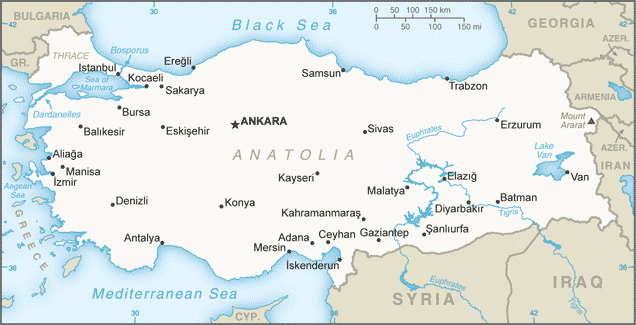
Turkey is a mostly mountainous area with narrow coastal plains and a treeless central plateau. Climate is temperate with hot and dry summers while winters are mild and wet. Interior weather, though, is harsher. Turkey’s land borders are 2,627 kilometers long in total. Its coastline is 7,200 kilometers. Area: 780,580 sq km, of which 770,760 sq km is land and 9,820 sq km is water. Population is around 75 million. Turkish people comprise 80% of the population with the rest being Kurdish. The official language is Turkish. Kurdish, Dimli, Azeri and Kabardian are also spoken.
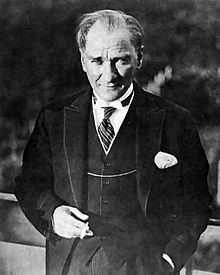
Mustafa Kemal Ataturk, founder of the Republic of Turkey
Turkey was formed in 1923 from what remained of the Ottoman Empire, which ruled for around 600 years.so, Modern Turkey was founded in 1923 from the Anatolian remnants of the defeated Ottoman Empire by national hero Mustafa KEMAL, who was later honored with the title Ataturk or "Father of the Turks." Under his leadership, the country adopted wide-ranging social, legal, and political reforms. After a period of one-party rule, an experiment with multi-party politics led to the 1950 election victory of the opposition Democratic Party and the peaceful transfer of power. Since then, Turkish political parties have multiplied, but democracy has been fractured by periods of instability and intermittent military coups (1960, 1971, 1980), which in each case eventually resulted in a return of political power to civilians. In 1997, the military again helped engineer the ouster - popularly dubbed a "post-modern coup" - of the then Islamic-oriented government. Turkey intervened militarily on Cyprus in 1974 to prevent a Greek takeover of the island and has since acted as patron state to the "Turkish Republic of Northern Cyprus," which only Turkey recognizes. A separatist insurgency begun in 1984 by the Kurdistan Workers' Party (PKK) - now known as the Kurdistan People's Congress or Kongra-Gel (KGK) - has dominated the Turkish military's attention and claimed more than 30,000 lives. After the capture of the group's leader in 1999, the insurgents largely withdrew from Turkey mainly to northern Iraq. In 2013, KGK and the Turkish Government agreed to a ceasefire that continues despite slow progress in ongoing peace talks. Turkey joined the UN in 1945 and in 1952 it became a member of NATO. In 1964, Turkey became an associate member of the European Community. Over the past decade, it has undertaken many reforms to strengthen its democracy and economy; it began accession membership talks with the European Union in 2005.
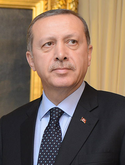
Rajab Tayyip Erdoğan
President
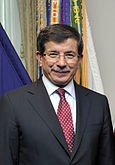
Ahmet Davutoğlu Prime Minister
Turkey is a parliamentary representative democracy. Since its foundation as a republic in 1923, Turkey has developed a strong tradition of secularism. Turkey's constitution governs the legal framework of the country. It sets out the main principles of government and establishes Turkey as a unitary centralized state. The President of the Republic is the head of state and has a largely ceremonial role. The president is elected for a five-year term by direct elections.
Executive power is exercised by the Prime Minister and the Council of Ministers which make up the government, while the legislative power is vested in the unicameral parliament, the Grand National Assembly of Turkey. The judiciary is independent of the executive and the legislature, and the Constitutional Court is charged with ruling on the conformity of laws and decrees with the constitution. The Council of State is the tribunal of last resort for administrative cases, and the High Court of Appeals for all others.
The prime minister is elected by the parliament through a vote of confidence in the government and is most often the head of the party having the most seats in parliament. The prime minister is Ahmet Davutoğlu who is also the leader of the Justice and Development Party (AKP) since 27 August 2014.
Universal suffrage for both sexes has been applied throughout Turkey since 1933, and every Turkish citizen who has turned 18 years of age has the right to vote. There are 550 members of parliament who are elected for a four-year term by a party-list proportional representation system from 85 electoral districts. The Constitutional Court can strip the public financing of political parties that it deems anti-secular or separatist, or ban their existence altogether. The electoral threshold is 10 percent of the votes. Supporters of Atatürk's reforms are called Kemalists, as distinguished from Islamists, representing two extremes on a continuum of beliefs about the proper role of religion in public life. The Kemalist position generally combines a kind of democracy with a laicist constitution and westernised secular lifestyle, while supporting state intervention in the economy, education, and other public services. Since the 1980s, a rise in income inequality and class distinction has given rise to Islamic populism, a movement that in theory supports obligation to authority, communal solidarity and social justice, though what that entails in practice is often contested.
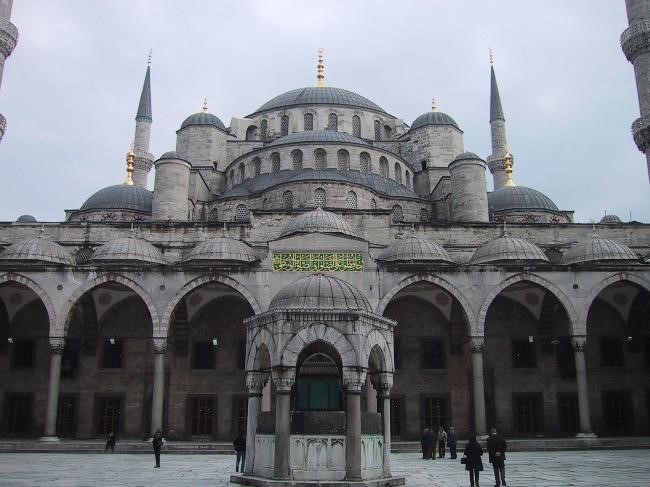
The Sultan Ahmed Mosque in Istanbul
Turkey is a secular state with no official state religion; the Turkish Constitution provides for freedom of religion and conscience. The role of religion has been a controversial debate over the years since the formation of Islamist parties. For many decades, the wearing of the hijab was banned in schools and government buildings because it was viewed as a symbol of political Islam. However, the ban was lifted from universities in 2011, from government buildings in 2013, and from schools in 2014.
Islam is the dominant religion of Turkey with 99.8 percent of the population being registered as Muslim. While some sources give a little lower estimate of 96.4 percent, with the most popular sect being the Hanafite school of Sunni Islam. The highest Islamic religious authority is the Presidency of Religious Affairs; it interprets the Hanafi School of law, and is responsible for regulating the operation of the country's 80,000 registered mosques and employing local and provincial imams. Academics suggest the Alevi population may be from 15 to 20 million, and according to Aksiyon magazine, the number of Shiite Twelvers (excluding Alevis) is 3 million (4.2 percent). There are also some Sufi Muslims. Roughly 2 percent are non-denominational Muslims.
The percentage of non-Muslims in Turkey fell from 19 percent in 1914 to 2.5 percent in 1927, due to events which had a significant impact on the country's demographic structure, such as the Armenian Genocide, the population exchange between Greece and Turkey, and the emigration of non-Muslims (such as Levantines, Greeks, Armenians, Jews, etc.) to foreign countries (mostly in Europe and the Americas) that actually began in the late 19th century and gained pace in the first quarter of the 20th century, especially during World War I and after the Turkish War of Independence. Today there are more than 120,000 people of different Christian denominations, representing less than 0.2 percent of Turkey's population.
There are about 26,000 people who are Jewish, the vast majority of whom are Sephardi. There have been Jewish communities in Asia Minor since at least the 5th century BCE and many Spanish and Portuguese Jews expelled from Spain were welcomed into the Ottoman Empire in the late 15th century, twenty centuries later. Despite emigration during the 20th century, modern-day Turkey continues to have a small Jewish population.
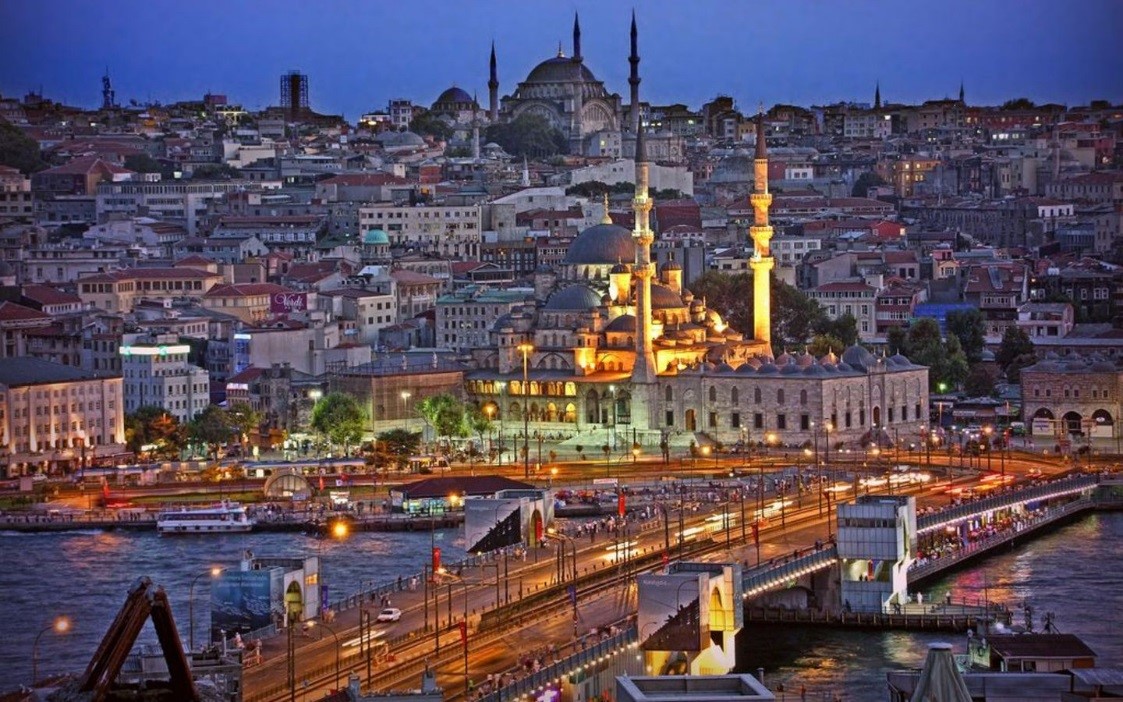
Istanbul
Turkey's largely free-market economy is increasingly driven by its industry and service sectors, although its traditional agriculture sector still accounts for about 25% of employment. An aggressive privatization program has reduced state involvement in basic industry, banking, transport, and communication, and an emerging cadre of middle-class entrepreneurs is adding dynamism to the economy and expanding production beyond the traditional textiles and clothing sectors. The automotive, construction, and electronics industries are rising in importance and have surpassed textiles within Turkey's export mix. Oil began to flow through the Baku-Tbilisi-Ceyhan pipeline in May 2006, marking a major milestone that will bring up to 1 million barrels per day from the Caspian to market. Several gas pipelines projects also are moving forward to help transport Central Asian gas to Europe through Turkey, which over the long term will help address Turkey's dependence on imported oil and gas to meet 97% of its energy needs. After Turkey experienced a severe financial crisis in 2001, Ankara adopted financial and fiscal reforms as part of an IMF program. The reforms strengthened the country's economic fundamentals and ushered in an era of strong growth averaging more than 6% annually until 2008. Global economic conditions and tighter fiscal policy caused GDP to contract in 2009, but Turkey's well-regulated financial markets and banking system helped the country weather the global financial crisis and GDP rebounded strongly to around 9% in 2010-11, as exports returned to normal levels following the recession. Growth dropped to roughly 3-4% in 2012-13. Turkey's public sector debt to GDP ratio has fallen below 40%, and two rating agencies upgraded Turkey's debt to investment grade in 2012 and 2013. Turkey remains dependent on often volatile, short-term investment to finance its large current account deficit. The stock value of FDI reached nearly $195 billion at year-end 2013, reflecting Turkey's robust growth even in the face of economic turmoil in Europe, the source of much of Turkey's FDI. Turkey's relatively high current account deficit, domestic political uncertainty, and turmoil within Turkey's neighborhood leave the economy vulnerable to destabilizing shifts in investor confidence.
Know your Imam to come in brief
The Awaited Imam, The Living Hujjah
The Awaited Imam, The Living Hujjah
The Holy Prophet [s] said: "The person who dies and has not known the Imam of his time (Imam Mahdi [a] is that of the present time) has died the same as one who died during the Age of Ignorance."
Musnad-i-Ahmad-ibn-Hanbal, vol. 2, p. 83; vol. 3, p. 446 & vol. 4, p. 96: Sahih-i-Bukhari, vol. 5, p. 13 & Sahih-i-Muslim vol. 6, p. 21, No.1849
Who is the Imam Mahdi that the Holy Prophet is talking about? Do we know who our Imam is? What exactly is an Imam? An Imam literally means a leader or someone who guides. Imams can be of three types: The Imam who leads prayers, the political Imam and the other one is an Imam for mankind. The third definition is what is going to be our main topic.
Allah (SWT) sends down prophets to guide the people to the straight path. Each prophet was given a task that is to preach the oneness of God, to maintain law and order in humanity. And the prophets may provide rules and regulations for the people to observe this humanity.
When the last prophet, Nabi Muhammad (saw) was sent down, the religion was make complete, there isn’t a need for another prophet to come down for it is completed. So where do the Imams come into the picture? After the Holy prophet's demise, there is a need to make sure that Islam remains protected and secure and that it is spread around to those who haven’t heard of it. And for this task, there is a need to have trusted people who can do this job well and they are the Imams.
There are 12 Imams in the line of the imamate and Imam Mahdi (the Guided one) is the twelfth Imam. There are many titles attributed to him that includes Al Muntazar (the awaited one), Sahibuz Zaman (the Lord of the Age), Al Qaim etc. The proof that Imam Mahdi (as) exists can be referred from the Holy Quran and the ahadeeth:
Yet We desired to be gracious to those who were abased in the land, and to make them leaders, and to make them the inheritors. (28:4)
For We have written in the Psalms, after the Remembrance, 'The earth shall be the inheritance of My righteous servants.' (21:105)
Abdullah Ibne Masood quotes the Holy Prophet as having said:
" Even when the entire time of the world’s existence will have been already exhausted and one solitary day left to embrace the eve of Doomsday, God will expand and make that very day swell to such a length of time as to accommodate the ultimate reign of a person out of my holy progeny who will be called after my name. He will then make the earth abound with peace and justice as it will have been fraught with the injustice and tyranny before him."
He was born on 256 AH in Samarra, Iraq. His father is Imam Hasan Al-Askari (as), the eleventh Imam and his mother is Bibi Nargis Khatoon (as).
The birth of the last Imam was kept in top secret because the authorities from the Abbasid regime are out to kill him. The reason was because they do not want another Imam that would topple their kingdom, nor give rulings and laws that would make their life uncomfortable. But the Imam was given divine protection and by Allah's will, he went into a minor occultation (Al-Ghayba Al-Sughra) on the 8th Shaban, 260 A.H. (872 A.D.) when he was five and he went into another occultation, the greater occultation, (Al-Ghayba Al-Kubra) which took place on 10 Shawwal, 329 A.H. (939 A.D.) The Holy Imam (as) will reappear during the end of the world where he would fill the earth with justice and equity after it being filled with injustice and oppression.
May Allah SWT hasten the reappearance of the Awaited Imam (AS)!
Maliki School of Thought (madhhab)
Maliki School of Thought (madhhab)
The Maliki madhhab is one of the four major schools of Fiqh or religious law within Sunni Islam. The Maliki school of thought was headed by Imam Malik ibn Anas al-Asbahi who lived from 93H to 179H. He was born in the holy city of Medina, and his fame spread throughout Hijaz. Maliki School of jurisprudence relies on Quran and hadiths as primary sources. Unlike other Islamic fiqhs, Maliki fiqh also considers the consensus of the people of Medina to be valid source of Islamic law.
The Abbasids tried to set him up as a popular reference for the nation in giving verdicts and injunctions. The Abbasid caliph al-Mansur asked him to write al-Muwatta’, his book of fiqh, which contains the principles of the Maliki school of thought. Furthermore, during the hajj season, the official announcer of the government proclaimed that no one had the authority to give fatawas (religious decisions) except for Imam Malik.
Maliki madhhab is one of the largest group of Sunni Muslims, comparable to Shafii madhhab in adherents, but smaller than the Hanafi madhhab. Sharia based on Maliki doctrine is predominantly found in North Africa excluding northern and eastern Egypt, West Africa, Chad, Sudan, Kuwait, Qatar, Bahrain, Emirates of Dubai and Abu Dhabi (UAE), and in northeastern parts of Saudi Arabia. The Murabitun World Movement also follows the Maliki School.
In the medieval era, Maliki School was also found in parts of Europe under Islamic rule, particularly Islamic Spain and the Emirate of Sicily. A major historical center of Maliki teaching, from 9th to 11th centuries, was in the Mosque of Uqba of Tunisia

Mosque of Uqba
The Maliki School primarily derives from the work of Imam Malik ibn Anas, particularly the Muwatta. Imam Malik, also known as Al-Muwatta. The Muwaṭṭa relies on Sahih Hadiths, includes Malik ibn Anas' commentary. Malik included the practices of the people of Medina where the practices are in compliance with or in variance with the hadiths reported. This is because Malik regarded the practices of Medina (the first three generations) to be a superior proof of the "living" sunnah than isolated, although sound, hadiths.
The second source, the Mudawwanah, is the collaborator work of Malik's longtime student, Ibn Qāsim and his mujtahid student, Sahnun. The Mudawwanah consists of the notes of Ibn Qāsim from his sessions of learning with Mālik and answers to legal questions raised by Saḥnūn in which Ibn Qāsim quotes from Malik, and where no notes existed, his own legal reasoning based upon the principles he learned from Malik. These two books, i.e. the Muwaṭṭah and Mudawwanah, along with other primary books taken from other prominent students of Malik, would find their way into the Mukhtaṣar Khalīl, which would form the basis for the later Maliki madhhab.
Maliki School is most closely related to the Hanafi School, and the difference between them is more of a degree, rather than nature. However, unlike Hanafi school, Maliki school does not assign as much weight to analogy, but derives it rulings from pragmatism using the principles of istislah (public interest) wherever the Quran and Shahih Hadiths do not provide explicit guidance.
Maliki School considers apostasy that is the act of leaving Islam or converting to another religion or becoming an atheist, as a religious crime. Both men and women apostates deserve death penalty according to the traditional view of Sunni Maliki fiqh and the property of the apostate is seized and distributed to his or her Muslim relatives; his or her marriage annulled (faskh); any children removed and considered ward of the Islamic state.
Maliki law views blasphemy as an offense distinct from, and more severe than apostasy. Death is mandatory in cases of blasphemy by Muslim men, and repentance is not accepted. For women, death is not the required punishment, but she is arrested and punished till she repents and returns to Islam or dies in custody. A non-Muslim who commits blasphemy against Islam must be punished; however, he or she can escape punishment by converting and becoming a devout Muslim.

The grave of Imam Malik in Medina Al Monavarah
Pakistan
Pakistan
Islamic Republic of Pakistan is a sovereign country in South Asia. With a population exceeding 180 million people, it is the sixth most populous country in the world that 96% of them Muslim. This makes it the second most populous Muslim country. The overwhelming majority of Pakistan's people are Muslim ,both Sunnis and Shias but Sunnis are form the majority while the Shias has the second largest number of Shias after Iran. The majority of Pakistani Sunnis belong to the Ḥanafiyyah (Hanafite) school, which is one of four major schools (madhhabs) or subsects of Islamic jurisprudence. Among Sunnis, Sufism is extremely popular and influential. In addition to the two main groups there is a very small sect called the Aḥmadiyyah, which is also sometimes called the Qadiani (for Qadian, India, where the sect originated). Among the Shiites there are several subsects; notable are the Ismailis (or Seveners)—including the Nizaris (followers of the Aga Khans, among whom are the Khojas and the Bohrās), who are prominent in commerce and industry—and the Ithna ʿAshariyyah (or Twelvers). After Islam, Hinduism and Christianity are the largest religions in Pakistan
Pakistan is bordered by India to the east, Afghanistan to the west, Islamic Republic of Iran to the southwest and China in the far northeast. It is separated from Tajikistan by Afghanistan's narrow Wakhan Corridor in the north, and also shares a marine border with Oman. This country is comprised of four primary provinces: Northwest Frontier Province, Punjab, Sindh and Balochistan.

Hinduism, Buddhism, and Shamanism were the prominent religions in the region until Muslim conquered this area during the 7th century AD.

Badshahi Mosque, Lahore
Pakistan has a long history of being conquered and ruled by outsiders, most recently, the region was part of British India before gaining independence in 1947.It was the Mughal Empire that converted much of the region of Pakistan from Buddhist and Hindu to Islam, and as the empire began to decline during the early 18th century, Afghans, Balochis and Sikhs assumed control until the British East India Company ascended over South Asia.

Shah Jahan Mosque, Thatta was patronized by the Mughal Emperor Shah Jahan.
From 10th century A.D. onwards, a systematic conquest of Indo-Pakistan by the Muslims from Central Asia began and lasted up to 18th century A.D., when the British colonized the Sub-continent and ruled for nearly 200 years (for 100 years over what is now Pakistan). The Muslim revival began towards the end of the last century when Sir Syed Ahmed Khan, a renowned leader and educationist, launched a movement for intellectual renaissance of the Indian Muslims. In 1930, the well-known poet/philosopher, Dr. Mohammed Iqbal conceived the idea of a separate state for the Muslims of the Sub-continent, and in 1940, the All-India Muslim League adopted the famous Pakistan Resolution.
After seven years of untiring struggle, under the brilliant leadership of Quaid-e-Azam Mohammed Ali Jinnah, Pakistan emerged on the world map as a sovereign state on August 14, 1947, when the British Indian Empire was partitioned into two independent states - India and Pakistan.
In 1947, as British rule came to an end in India, Pakistan was created when the Muslim-dominated parts of India of Hindu India, were given autonomy. Pakistan was created in 1947 as an independent nation for Muslims from the regions in the east and west of Subcontinent where there was a Muslim majority. For almost 25 years following independence, it consisted of two separate regions, East and West Pakistan, but now it is made up only of the western sector. Both India and Pakistan have laid claim to the Kashmir region; this territorial dispute led to war in 1949, 1965, 1971, 1999, and remains unresolved today.
Initially a dominion, Pakistan adopted a new constitution in 1956, becoming an Islamic republic .then, the city of Islamabad, with its mix of traditional Islamic architecture styles and modern features, became the capital city of this country. A few years later a civil war in 1971 resulted in the secession of East Pakistan as the new country of Bangladesh.
Although the capital city of Pakistan is Islamabad, the city of Karachi is the country's financial center and the most populous city.
Now, Mr. Mamnoon Hussain is the President of the Islamic Republic of Pakistan In .he was elected as the 12th President of Pakistan through his official nomination made by PML (N). He took the oath of office on September 09, 2013. Since he has a firm belief that the office of the President of Pakistan is a symbol of Federation and should be apolitical, therefore, he has resigned from the PML (N). Mr. Mamnoon Hussain is known as a man of impeccable integrity and courage against all odds.
Pakistan has constructed and operated civil nuclear power plants. The Pakistan Atomic Energy Commission (PAEC), the scientific and nuclear governmental agency, is solely responsible for operating these power plants.
The economy, which was primarily agricultural at the time of independence, has become considerably diversified. Agriculture, now no longer the largest sector, contributes roughly one-fifth of GDP, while manufacturing provides about one-sixth. Trade and services, which combined constitute the largest component of the economy, have grown considerably. Economic performance compares favorably with that of many other developing countries; Pakistan has maintained a sustained and fairly steady annual growth rate since independence.This country is not known for its stability, but its financial outlook is considered strong and continues to grow at a good rate.

View of Pakistan's capital Islamabad

Pakistani textile market, Pakistan has the third largest spinning capacity in Asia.

Shalimar Gardens, Lahore was constructed in 1641 AD, today it is listed as a UNESCO World Heritage Site

Lahore Metro Bus System is country's first Bus Rapid Transit, while Metrobus Rawalpindi-Islamabad is under construction

Government College University, Lahore is the oldest institution of higher education in the Muslim world
.
